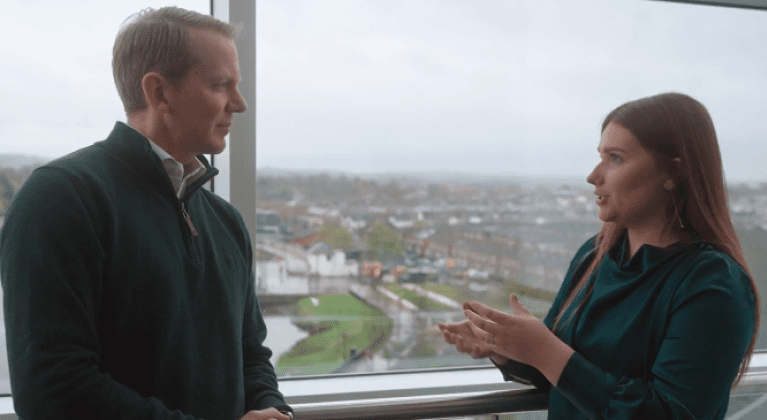Our purpose and strategy
Our purpose is Helping Britain Prosper.

Helping customers keep their money safe is a top priority at Lloyds Banking Group. We invest tens of millions of pounds every year in the latest technology to protect our customers from fraud.

Key moments in this video include:
The total figure lost through fraud in 2023 was
£1.17bn
(£708.7m in unauthorised fraud and £459.7m in authorised fraud.)*
We've committed more than
£100m
in the last three years to technology solutions and operational resource to detect and prevent fraud.
Our dedicated team is working 24 hours a day, 7 days a week,
365 days a year
to fight fraud.
*UK Finance Annual Fraud Report 2023

We joined forces with City of London Police to launch the industry’s first pilot scheme using proceeds of crime to fund fraud-fighting and victim support programmes.
The ‘frozen’ cash – money captured from fraudsters by our specialist mule-hunting team – has been invested in projects to tackle fraud, as well as increasing education and awareness to help people recognise scams.
One of the initiatives that has been funded is a Dedicated Card and Payment Crime Unit (DCPCU) specialist team tracking down criminals through cyber investigations, which can lead to disrupting other illegal activity often associated with fraud, such as drugs and people trafficking.
Funds will also be used to provide additional support for people who have fallen victim to fraudsters. One initiative that will benefit is Victim Support who will be supporting victims of romance scams. Age UK will benefit and will be helping older people through their Scams Prevention and Support Programme which helps older people to increase their knowledge and confidence in recognising and dealing with attempted scams.
Funds will also be used to educate students on how to protect themselves from becoming a money mule through Crooks on Campus.

We were the first organisation in Europe to introduce new state of the art fraud prevention technology, helping protect our 30 million customers from telephone fraudsters.
Our branch and telephone banking colleagues are specially trained to identify signs that could indicate that a customer could be a victim of fraud and we are a leading supporter of the ‘Banking Protocol’ initiative, working together with the police to help intervene if a customer is at risk.
We pay particular attention to the wording and design of our fraud warnings, using behavioural analysis and expert insight to prevent our customers falling victim to scams.
We were the first bank to provide an extra layer of protection when making online payments through the introduction of the name checking service, Confirmation of Payee.
This service is available when both the bank you are sending the funds from and the bank who are receiving the payment have implemented the service. Prior to Confirmation of Payee it was hard to know if you were really paying the right person – something fraudsters were happy to exploit.
This service is now live for all of our Halifax, Bank of Scotland and Lloyds customers, so they can ensure they are actually paying the person they intended.
We became one of the first banks to take part in the launch of the 159 fraud initiative, for people to use to report and check financial scams as they happen.
Anyone who receives a call or message from somebody claiming to be from a trusted organisation and who suggests money should be transferred is being urged to hang up and call 159. They’ll then be connected to their own bank’s fraud prevention team. This new service is being promoted by Stop Scams UK - a coalition of banking and technology companies.
Our strong partnership with the City of London Police enables us to work together on Fraud prevention initiatives, including the ‘Crooks on Campus’ campaign with We Fight Fraud, a financial crime prevention group.
Crooks on Campus is a crime documentary/drama based upon real-life stories of money laundering, fraud, and financial crime. It's targeted directly to the student audience to inform, educate, and prevent young people becoming money mules and engaged in criminal activity. Through Project Olaf, we are currently supporting the national roll out of ‘Crooks on Campus’ to all UK universities.
We’ve teamed up with The Association for UK Interactive Entertainment (Ukie) to create the Game Players Code - SHIELD. This is a simple, six-step guide for players to follow to help prevent scammers from accessing their personal information and protect their money from fraudsters operating in the gaming space.
We’re committed to working in collaboration with the research and security practitioner community to improve our online security.
If you’ve discovered something you believe to be a security vulnerability, please read our Responsible Vulnerability Disclosure Policy which guides security researchers on how to share identified issues. Please note, we won't respond to submissions which contain attachments.
All qualifying vulnerabilities will be investigated, and the submitter will receive updates on progress.